On this page you can find our blogs about different aspects of preventing and living with dementia. Many of them include research evidence and also reflections from people affected by dementia themselves or in supportive roles as carers, family members or health professionals. There are also links to helpful resources.
Page last updated on 11 July 2023.
You can either scroll through this page or click on any of the links below to jump to the relevant section:
2
Preventing dementia
Preventing dementia: what’s the evidence?
In a blog Preventing dementia: what’s the evidence? (May 2022) James Garrard, Specialist Registrar in Geriatric Medicine, looks at the evidence on various drug and non-drug approaches to try and prevent dementia.
Behind the headlines: can one in three dementia cases be prevented?
In a blog originally posted on the Alzheimer’s Research UK Blog, Behind the headlines: can one in three dementia cases be prevented? (August 2017) Kirsty Marais goes behind the headlines that 1 in 3 dementia cases could be prevented, unpacking what the Lancet Commission on Dementia found.
Do vitamin and mineral supplements have a role in preventing dementia?
In her blog Preventing dementia: do vitamin and mineral supplements have a role? (January 2019) Sarah Chapman takes a look at the evidence on vitamin and mineral supplements for preventing dementia or at least slowing cognitive decline.
Commonly prescribed drugs and dementia: should we be worried?
In a blog for people interested in memory, thinking problems and dementia, Commonly prescribed drugs and dementia: should we be worried? (April 2022), Jodi Watt (a researcher at the University of Glasgow) looks at the latest Cochrane evidence on whether a class of commonly-used medications (anticholinergics) might increase people’s risk of future memory problems, or even dementia.
2
Diagnosing dementia
Diagnosis by phone and video
In Dementia diagnosis by phone and video: pitfalls and possibilities (May 2022), a blog for people interested in ways to diagnose dementia, and the use of remote methods of assessment, Lucy Beishon, specialist trainee in geriatric medicine and NIHR Academic Clinical Lecturer in Geriatric medicine, talks about the evidence, reflects on her experiences during the pandemic, and looks to the future.
A decade of evidence on diagnosing dementia
In Dementia diagnosis: a decade of evidence (September 2019, updated April 2022), a blog for clinical, research and lay readers, Dr Terry Quinn looks at the latest Cochrane evidence around testing for dementia. Terry describes the Dementia Group’s ongoing work on dementia assessment and shares some thoughts on reviews of test accuracy.
Identifying possible dementia using a questionnaire
In a blog for members of the public and the professionals who care for them, Diagnosing dementia: is a questionnaire (IQCODE) good enough? (July 2017, updated April 22), Terry Quinn and Jenni Burton summarise the findings of a series of Cochrane Reviews describing a structured questionnaire that is used to help identify possible dementia. The questionnaire is called the IQCODE (Informant Questionnaire for COgnitive Decline in the Elderly).
Writing a Cochrane Review about tests used in diagnosing dementia
In a blog for anyone interested in dementia diagnosis or the process of conducting a Cochrane diagnostic test accuracy review, Writing a Cochrane Review: my experiences of a diagnostic test accuracy review (March 2020), Dr Lucy Beishon from University of Leicester discusses her Cochrane Review and her experiences of working with the Cochrane Dementia and Cognitive Improvement Group.
2
Living with dementia and managing symptoms
Supporting healthcare decision-making
What do you need to think about when supporting a loved one in deciding whether to have a test or treatment, especially when their health compromises their ability to do this for themselves? In the blog Informed decision-making: “we can” doesn’t mean “we should” (April 2018, updated August 2022) Kit Byatt, a retired geriatrician, and Sarah Chapman reflect on their discussion about this when Sarah’s mother, who had dementia, was offered statins. They also suggest some principles and questions that might help others who are supporting someone faced with a health decision.
Drug treatments
See also the above blog on Informed decision-making: “we can” doesn’t mean “we should” (April 2018, updated August 2022).
A decision aid to help you consider the options
The National Institute for Health and Care Excellence (NICE) has a helpful Decision aid: antipsychotic medicines for treating agitation, aggression and distress in people living with dementia (published 2018) which has information to help people living with dementia, their family members and carers and their healthcare professionals discuss the options.
Drugs for agitation
In the blog Drugs for agitation in people with dementia: benefits and risks (May 2022), written for the families of people with dementia, doctors Charlotte Squires and James Garrard talk about drugs used to treat symptoms of agitation and psychosis in people with diagnosed dementia. They reflect on what doctors and families together might want to consider when making decisions about trying these treatments.
Medicines for sleep problems
There is “a distinct lack of evidence to guide decisions about drug treatment of sleep problems in dementia”, say the authors of the Cochrane Review Pharmacotherapies for sleep disturbances in dementia (published November 2020). In particular, they found “no trials of many widely prescribed drugs, including the benzodiazepine and non-benzodiazepine hypnotics, although there is considerable uncertainty about the balance of benefits and risks for these common treatments”.
The authors did find that melatonin (up to 10 mg) or a melatonin receptor agonist may have little to no beneficial effects on sleep.
However, orexin antagonists probably have some beneficial effects on sleep and trazodone may have some benefits too.
No serious adverse effects (harms) were reported in the studies. However, the studies did not include many people – so larger, high-quality trials are needed, and it’s important that these trials carefully look at potential side effects.
You can read a Cochrane Clinical Answer about this review: “For older adults with Alzheimer’s dementia and sleep disturbances, what are the effects of orexin antagonists?”
As for alternatives to medicines for sleep problems, the authors of a Cochrane Review on Non‐pharmacological interventions for sleep disturbances in people with dementia (published January 2023) have found an evidence gap here too. They conclude “Despite the inclusion of 19 randomised controlled trials, there is a lack of conclusive evidence concerning non‐pharmacological interventions for sleep problems in people with dementia.” However, the evidence suggests that “physical activity interventions, social activities, carer interventions, and multimodal interventions may slightly or modestly improve night‐time sleep in people with dementia.”
Rivastigmine
In the blog Rivastigmine reviewed: doubts about dementia drug, nurse Helen Cowan reflects on Cochrane evidence on rivastigmine and the use of this drug in practice.
Drug withdrawal
In the blog Drug withdrawal in people with dementia: what we know (July 2017, updated August 2022) geriatrician Kit Byatt considers the state of the evidence on drug withdrawal in people with dementia.
Non-drug therapies
Activities
In the blog Activities for people with dementia: what can evidence and experience teach us? (December 2020, updated July 21), written for those caring for people with dementia, Sarah Chapman looks at evidence on personally tailored activities for people with dementia and shares insights from her own experience and those of others. The blog also includes a list of books that Sarah found helpful.
Cognitive stimulation
Cognitive stimulation is a structured approach that aims to engage people with dementia in enjoyable activities that generally stimulate areas of cognition such as thinking, language skills, concentration and memory. In his blog – Cognitive stimulation for people with dementia: making a difference – retired clinical psychologist and dementia care researcher, Bob Woods, explains how it might help people living with dementia.
Cognitive stimulation is recommended in NICE guidance, and the latest audit by the Royal College of Psychiatrists found that 96% of services now offer group cognitive stimulation therapy.
Pet therapy
The blog Pet therapy for older people in care homes: what’s the evidence? (January 2020) looks at the evidence on pet therapy for older people, including people with dementia, in care homes and day-care facilities.
Art therapies
In the blog Arts therapies for people with dementia: “where words leave off, music begins” (published July 2017) Jenny McCleery, Consultant Psychiatrist and Joint Co-ordinating Editor of Cochrane Dementia and Cognitive Improvement, looks at Cochrane evidence on creative arts therapies for people with dementia.
Reminiscence therapy
In the blog Reminiscence therapy for people with dementia. Do memories matter? (June 2018, updated August 2022) dementia care practitioner and researcher Bob Woods talks about reminiscence therapy and the evidence which he and his colleagues brought together in their Cochrane Review.
Social living models
In her blog Social living models for people with dementia: future ways of living well at home? (July 2017) Carrie Jackson from the England Centre for Practice Development looks at innovations in supported care in the community, social living models, that might help people to live well with dementia.
Psychological treatments for depression and anxiety
The Cochrane Review Psychological treatments for depression and anxiety in dementia and mild cognitive impairment (published April 2022) found that:
-
-
- “Psychological treatments based on cognitive behavioural therapy (which focuses on changing thoughts and behaviours) probably have small positive effects on depression, quality of life and daily activities in people with dementia or mild cognitive impairment (MCI).
- There is not enough evidence to know whether any psychological treatments are helpful for anxiety in people with dementia or MCI.
- More evidence is needed about different types of psychological treatments and which treatments may be best for which people”.
-
2
End of life
Tube feeding
In the blog Tube feeding for people with severe dementia: making decisions (updated December 2021), Charlotte Squires, a trainee doctor in older adult care, reflects on issues with eating for people with severe dementia and options for supporting them, including new evidence on tube feeding. Sarah Chapman and friend Sue share experiences from supporting their mums with dementia.
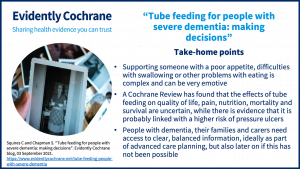
Helping you decide
There is a decision aid on this from NICE – Decision aid: enteral (tube) feeding for people living with severe dementia (published 2018). It has information to help people living with dementia, their family members and carers and their healthcare professionals discuss the options.
Talking and learning about dying
In the blog Talking about dying: better conversations at the end of life (August 2022) Sarah Chapman, whose Mum died during the first lockdown, reflects on the text conversations she had with her Mum’s carer about her dying. She also talks about recent evidence on effective communication between health professionals, those who are dying and their families and about our need for knowledge of ordinary dying when many of us don’t witness a death until we are older adults ourselves. The blog also contains sources of information and support for non-medical people and health professionals.
2
Support for carers of people with dementia

In the blog Carers of people with dementia: with them, through to the end of it (July 2017) Sarah Chapman looks at the state of the evidence on interventions that might help carers of people with dementia and talks to Justine about her experience.
In her blog Carer at the end of the line: evidence and experience of telephone support (June 2019, updated August 2022) Karen Morley reflects on the lack of connections for her when she was caring for her mother, looks at the evidence for telephone support and support by other modes, and gives a snapshot of her life as a carer, in four phone calls.
Sources of information and support for carers include:
-
-
- Age UK has lots of information for carers, including this page on Caring for someone with dementia.
- Alzheimers UK Support for carers
- Carers UK has information and support for carers. They are currently inviting you to take part in the State of Caring survey 2022.
- Carers Trust Caring for someone with dementia
- Dementia Carers Count “is a national charity, offering a range of free services that give family carers the opportunity to learn and understand more about dementia and to connect with others in a similar situation.”
- Dementia UK Get support
- NHS Looking after someone with dementia includes information about applying for a carer’s assessment, checking your eligibility for benefits and signposts local support groups.
-
2
Taking part in research
Dementia and hearing conditions: what do we need to know?
This blog introduces a new project (from March 2023) to find out the most important questions to research for people with dementia and hearing conditions. There will be opportunities for the public to take part.
Wendy Mitchell, who has young onset dementia, writes about taking part in dementia research and being valued again, in her blog I have dementia and I take part in research. Here’s why (July 2017).
If you’re interested in taking part in research:
-
-
- The National Institute of Health Research page Be Part of Research has opportunities that you can search for by location and keyword (such as the name of a condition or treatment). They also have tips for carers to get and stay involved in research.
- Alzheimer’s Research UK has opportunities to take part in research and information about dementia research.
- Cochrane Crowd is Cochrane’s citizen science platform. Anyone can join and no previous experience is necessary.
-
2
Some information and resources
We have listed some sources of information and support for carers in the section above – Support for carers of people with dementia
NHS and UK Government
-
-
- NHS Dementia guide
- NHS Dementia Information Service You can sign up to receive a weekly email for 6 weeks, each one covering a different topic.
- Gov.uk After diagnosis of dementia: what to expect from health and care services
-
UK charities
-
-
- Alzheimer’s Society – which runs the Dementia Connect support line on 0333 150 3456, which provides information and advice about dementia. They also have a community forum, Talking Point.
- Alzheimer Scotland
- Dementia UK – which hosts the Young dementia network and the Admiral Nurse Dementia Helpline – call (free) 0800 888 6678 or email helpline@dementiauk.org or fill in the form on the web page to contact one of these specialist nurses in dementia care. The Helpline is for carers, people with dementia and health and social care professionals.
- The Lewy body Society
-
Living with Dementia Toolkit
The Living with Dementia Toolkit is a set of resources based on research and the experiences of people with dementia and their carers, created by researchers and people affected by dementia together. There is a downloadable version as well as resources you can use on the website. The resources are intended to give you hope for the future, inspire you through real-life experiences, and offer ideas to help you live your life as you choose.
Dementia books
-
-
- Reading Well Books on Prescription for Dementia recommends books you might find helpful if you have dementia, are caring for someone with dementia or would like to find out more about the condition. They are endorsed by health professionals and can be found in local libraries.
- Sarah Chapman’s blog Activities for people with dementia: what can evidence and experience teach us? includes a list of books Sarah found helpful when supporting her Mum with dementia.
-
Join in the conversation on Twitter with @CochraneUK or leave a comment on the blog.
Please note, we cannot give specific medical advice and do not publish comments that link to individual pages requesting donations or to commercial sites, or appear to endorse commercial products. We welcome diverse views and encourage discussion but we ask that comments are respectful and reserve the right to not publish any we consider offensive. Cochrane UK does not fact-check – or endorse – readers’ comments, including any treatments mentioned.
Sarah Chapman and Selena Ryan-Vig have nothing to disclose.


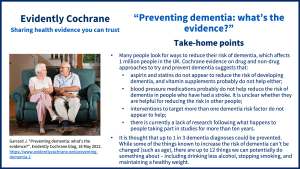
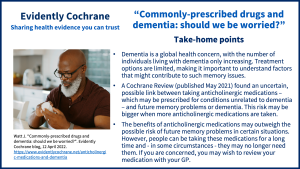
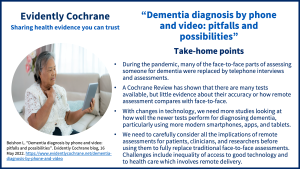
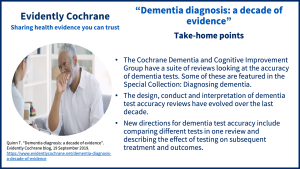
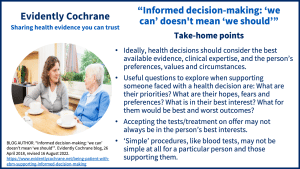
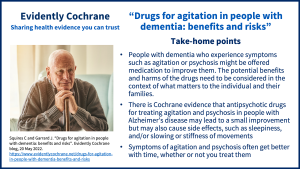
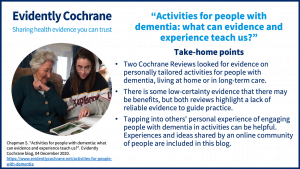
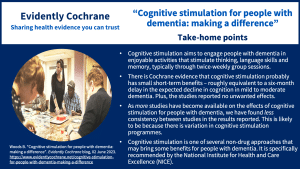
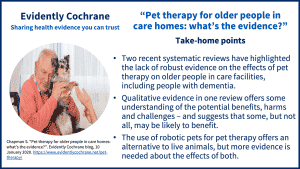
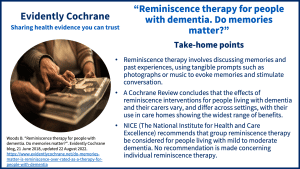
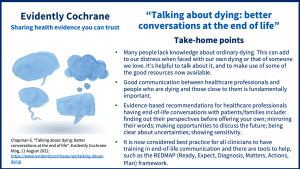
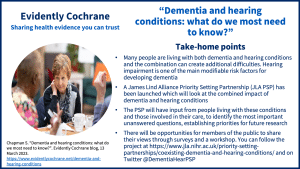

My grandmother is considering a dementia care facility because her memory loss has been progressively impacting her daily life, making it difficult for her to manage tasks and routines independently. Our family believes that a specialized care facility will offer the expertise and resources needed to provide her with a comfortable and supportive environment, where she can receive proper care and engagement to maintain her quality of life. It’s good to be aware though that while age and other factors that are known to raise the risk of dementia cannot be modified, there are up to 12 factors that we may be able to influence, such as reducing alcohol use, quitting smoking, and keeping a healthy weight.
Excellent overview. Thank you.